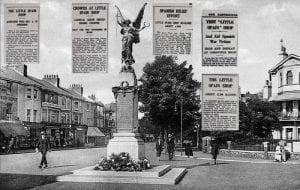As well as the ‘Sussex Brigaders’ themselves, and their legacy including among some key figures in the Home Guard during the Second World War, there was much wider anti-fascist solidarity across Sussex around the Spanish Civil War, particularly around supporting the children of the Basque region who came to Britain as refugees from the conflict, fleeing the fascist aerial bombing which had already laid waste to Guernica.
Solidarity with Basque Child Refugees from Spain
On 23rd May 1937, the SS Habana docked in Southampton with 3,861 children, 95 women teachers and 15 Catholic priests on board. The children were housed in a temporary camp on the outskirts of the city and eventually moved into residential homes around the country. Many of them were looked after by volunteers in Sussex. There was a Basque Children’s home for over 30 children at Penstone Place, Lancing. That building has since been demolished, but the local library stands on the site, and a plaque was put up on it a few years ago. 60 Basque children were housed in Worthing at Beach House where there is a plaque) – see the report of Priscilla Thorneycroft from 2008 about the Basque children at Worthing in 1937 here. There was also 20 Basque children housed in Uckfield (where a plaque was put up in 2012), and 20 in Eastbourne (see below) as well as in Brighton and Hove (at Girton House and what is now The Pines in Furze Hill). For more on the Basque children in Brighton, see Memories of Girton House by Javier Martinez Castillo.
Girton House (side view)

Pauline Fraser outside Girton House on 18 September 2021

The Pines, Furze Hill in Hove – originally called Aylesbury House this was a Basque children’s colony

Banners outside the Pines on 18 September 2021
The Basque government insisted the children should not be adopted by families, but stay in groups so as not to lose their national identity. Eventually, most of the children were repatriated to Spain but others had no home to go to because their parents had been killed or were in prison, so they made Britain their home. For more see the Basque Children of ’37 Association website.
The ‘Little Spain’ Shop in Eastbourne

Spanish Relief Effort. Eastbourne Chronicle Saturday August 27th 1938
The Hastings & St. Leonard’s Observer in January 1937 notes:
“Mrs. Isabel Brown, of the Spanish Medical Aid Committee, told of her recent experiences in Madrid. She exhibited a bomb of recent German manufacture, which she picked up in Madrid, and also a 1,000 German Mark note dated 1912. This had been taken from a Moor, and was a typical example of the currency with which Franco was deceiving his hirelings. She gave a graphic description of the work of the British Medical Unit, and claimed that despite enormous handicaps it was now operating with real efficiency. One innovation of great interest was the use of canned human blood for transfusions. Mr. Ernest Brown stated that the cost of the British Medical Unit was £25 a day, and he made a moving appeal for Hastings democrats to show their sympathy in a practical manner. Pound and ten shilling notes were quickly forthcoming, and in a few moments the sum of £21 3s. 10d. was collected, all of which will be sent to the British Medical Unit.”
Paul Robeson
The legendary black American socialist, singer and film star Paul Robeson performed regularly in Sussex as part of his career, but also did solidarity benefits in support of the fight against fascism in Spain in Sussex in the late 1930s. When Paul Robeson went to Spain to visit the International Brigades and give a concert to entertain them, one of those in attendance listening was Stan Hilton, a member of the International Brigades born in Newhaven who grew up in Brighton.





